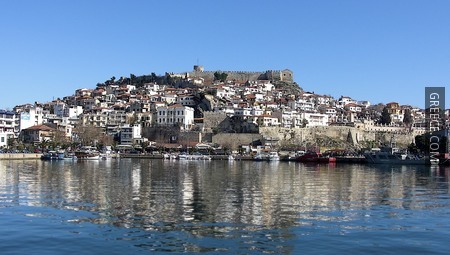General Information on Kavala
Kavala, the capital of its prefecture, is one of the most attractive cities in Greece. It is a modern city and main seaport of eastern Macedonia. It is situated on the Bay of Kavala opposite the island of Thassos. Kavala was built on top of the ancient city of Neapolis. Its population doubled during the second decade of the 20th century, when Greeks from Asia Minor came here, following a population exchange.
The lovely squares, contemporary buildings, and shopping centres on the west side of the city form a pleasant contrast to the traditional old houses, tiny gardens and flagged alleys of the eastern side. The harbour is particularly picturesque with its countless brightly coloured fishing boats moored along the waterfront. Among the city’s impressive landmarks are the old walls, the Byzantine castle and the Kamares (aqueduct erected by Suleiman the Magnificent in the 16th century, Mehmet Ali’s house and the Imaret, a Turkish building.
History of Kavala
Kavala was originally founded by settlers from Thassos Island during the 7th century B.C., who called it Neapolis (New City). The city gained its autonomy during the last part of the 6th century B.C. After the Persian wars, Neapolis became a member of the Delian Alliance in 454. During the Peloponnesian War, the city remained a faithful ally to Athens. In 411, Spartans led by general Eteonikos and with the aid of Thassians, besieged Neapolis. Later, it became a town of Macedonia, lost its autonomy and its importance as a city, and served as a port to the city of Philipi.
From 350 B.C. Philip II, king of Macedonia, conquered the area of Kavala. In 168 B.C., the city became a Roman city, and in 42 B.C. was the base of Brutus and Cassius before their defeat in the Battle of Philippi. In 49 B.C, Apostle Paul, preaching Christianity, visited Phillipi, where he baptised Lidia, the first Christian of Europe; as a result, he was subsequently imprisoned. In the 9th century, the Byzantines conquered Kavala, which at the time was called Christoupolis. The city belonged to the administrative prefecture of Strymon and its fort was used as a naval base in the struggle to eliminate piracy in the north Aegean, as well as against the Slavic raids.
Later in 1387, Kavala fell under the domination of the Turks, who destroyed it in 1391. After its capture and destruction, the city ceased to exist and was replaced by a strong fort with a few guards. The Venetian seized the fort of Christoupolis in 1425, but the Ottomans, returning here with 12,000 cavalry and infantry, recaptured it after a 20-day siege. Kavala got its modern name around the middle or end of the 15th century. The resettling and founding of Kavala occurred in 1527 or 1528 and its first inhabitants were probably Jews from Spain. In the middle of the 16th century, Kavala grew and transformed, as its wall was extended, while Suleiman the Great and his Prime Minister Ibrahim ordered the construction of several important buildings, such as the Aqueduct (Kamares).
At the end of the 18th century, Kavala had a population of two thousand, the majority of whom were Muslim farmers, and some Greeks, who were involved in trading. The city kept growing, and at the end of the 19th century, it numbered 20,000 people. Kavala was captured by the Bulgarians during the first Balkan War and was liberated on 16 June by a Greek naval unit, headed by Admiral Pavlos Koundouriotis. The history of the city was to be marked by the arrival of about 25,000 refugees after the catastrophic events in Asia Minor. During World War II, Kavala was given back to the Bulgarians. After the end of the civil war, the city, after the difficult times in the 50s, finally started its way to financial growth and progress.
Beaches in Kavala
Nea Iraklitsa: This charming seaside resort with its long, sandy beach is worth a visit. There are hotels, a wide range of tourist facilities and the appropriate infrastructure for climbers and diving lovers. You can explore several caves on the islets of Kokkina, Fidonissi and Panagia nearby, by boat.
Nea Peramos: This is the capital of a municipality consisting of three villages and has all kinds of tourist facilities. Ammolofoi (the Greek word for sand dunes) is one of the most popular beaches in Greece and stretches for miles. Hotels, rooms for rent and a campsite provide comfortable accommodation.
Akti Ofryniou (Touzla): This holiday resort is an ideal base for exploring the coastal zone (50km long) which has amazing beaches for all tastes.
How to Reach Kavala
Air: Kavala shares the Chrisoupolis airport, 29km east of town, with Xanthi. There are daily flights to/from Athens, as well as many connections to international destinations. During summertime, charter flights also land here.
Bus: From the intercity bus station, buses go to Athens (9½ hours), Xanthi (1 hour), Keramoti (1 hour) and Thessaloniki (2 hours). For Philippi, you’ll have to take the bus to Drama and get off at the ancient site (20 minutes). Buses to Alexandroupolis (2½ hours) leave from Chrisostomou Kavalas street.
Ferry: There are ferry services from Kavala to Skala Prinou in Thasos (1¼ hours). In summer, there are ferries to Samothraki (4 hours), Limnos (5 hours), Agios Efstratios (6¾ hours) and Lesvos (10 hours). Some services also reach Rafina and Piraeus via Chios and Samos.
Top 10 Destinations in Kavala
All Destinations in Kavala
Map of Kavala
 Athens Photos
Athens Photos
 Santorini Photos
Santorini Photos
 Crete Photos
Crete Photos
 Meteora Photos
Meteora Photos
 Corfu Photos
Corfu Photos






























